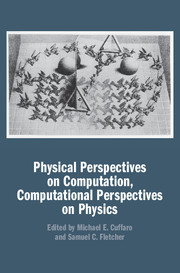Zuse’s Thesis, Gandy’s Thesis, and Penrose’s Thesis
(with Jack Copeland & Oron Shagrir)
2018 Computational Perspectives on Physics, Physical Perspectives on Computation (edited by Michael Cuffano & Samuel Fletcher), Cambridge University Press: Cambridge, pp. 39–59
Last updated 24 April 2018
Konrad Zuse said that the entire universe is a computer. Robin Gandy said that the whole universe, if not a computer, is computable. Roger Penrose said that the universe is in part uncomputable. We survey the territory. Zuse’s thesis we believe to be plain false: the universe might have consisted of nothing but a giant computer, but in fact does not. Gandy viewed his thesis as a relatively a priori one, provable on the basis of a set-theoretic argument making only very general physical assumptions about decomposability into parts and the nature of causation. We maintain that Gandy’s proof does not work, and that his thesis is best viewed, like Penrose’s, as an open empirical hypothesis. But what kind of evidence is relevant to discovering the truth of the matter? We investigate.

Konrad Zuse said that the entire universe is a computer. Robin Gandy said that the whole universe, if not a computer, is computable. Roger Penrose said that the universe is in part uncomputable. We survey the territory. Zuse’s thesis we believe to be plain false: the universe might have consisted of nothing but a giant computer, but in fact does not. Gandy viewed his thesis as a relatively a priori one, provable on the basis of a set-theoretic argument making only very general physical assumptions about decomposability into parts and the nature of causation. We maintain that Gandy’s proof does not work, and that his thesis is best viewed, like Penrose’s, as an open empirical hypothesis. But what kind of evidence is relevant to discovering the truth of the matter? We investigate.
HTML version of full text not available
PDF available above
